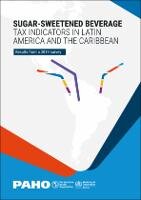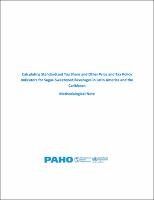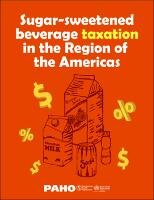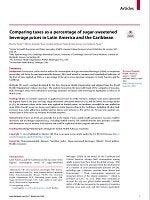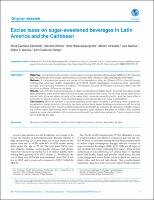The scientific evidence is robust on the link between specific dietary intake levels and patterns, and the development of obesity, overweight, and related noncommunicable diseases (NCDs). Sugar-sweetened beverages (SSBs) have been singled out as one of the most significant drivers of the obesity epidemic. SSB consumption is associated with weight gain in children and adults, increased incidence of type 2 diabetes, cardiovascular disease, dental caries, and osteoporosis. In Latin America and the Caribbean, the mortality rate attributable to SSBs is higher than in any other region.
WHO recommends reducing sugar consumption through effective taxation of SSBs as part of a menu of cost-effective, evidence-based policies in the WHO Global Action Plan for the Prevention and Control of NCDs 2013–2020. Taxes on SSBs—as well as taxes on tobacco products and alcoholic beverages—represent a triple win for governments because they 1) improve population health, 2) generate revenue, and 3) have the potential to reduce long-term associated healthcare costs and productivity losses.
As of March 2019, 21 out of the 33 Latin American and Caribbean Member States of the Pan American Health Organization (PAHO) apply excise taxes on SSBs, with 6 out of 14 countries in the Caribbean (data missing for Haiti) and 15 out of 19 in Latin America.
Eleven countries do not apply excise taxes on SSBs, including Antigua and Barbuda, the Bahamas, Colombia, Cuba, the Dominican Republic, Grenada, Guyana, Jamaica, Saint Lucia, Trinidad and Tobago, and the Bolivarian Republic of Venezuela.
There is great heterogeneity in excise taxes on SSBs design and rates, and most could be further leveraged to improve their impact on SSB consumption and health.
Source: Sugar-sweetened beverage taxes indicators in Latin America and the Caribbean. Results from a 2019 survey. Pan American Health Organization. 2022. https://iris.paho.org/handle/10665.2/56103. Data as of March 2019.
The Pan American Health Organization (PAHO) is committed to providing Member States with accurate, relevant, and internationally comparable information that they can use to guide the development of policy and to evaluate the impact of measures to prevent overweight and obesity.
The Department of Noncommunicable Diseases and Mental Health (NMH) at PAHO has been working on developing standardized and comparable indicators of the share of indirect taxes in the retail price of SSBs.
This topic presents the results of pioneer tax share and complementary price and tax policy indicators for nonalcoholic beverages in 27 Latin American and Caribbean PAHO Member States.
Excise Tax Share
The highest median excise tax share among countries applying excise taxes on SSBs was observed for large sugar-sweetened carbonated drinks (6.5%) and sugar-sweetened milk drinks (6.5%, although only three of the countries analyzed applied excise taxes on this beverage category).
The median excise tax in bottled water was 5.6%, although only four of the countries analyzed applied excise taxes on this beverage category). Meanwhile, the mean excise tax share in small sugar-sweetened carbonated drinks (5.0%), fruit drinks (4.3%), and energy drinks (2.3%) were lower than bottled water.
Tax Policy Indicators
Ten out of 27 countries participating in the PAHO SSB Tax survey did not apply excise taxes on SSB in LAC.
Across those 17 countries that applied excise taxes on SSBs, there are variations in the design and characteristics of their excise tax policies.
Source: Sugar-sweetened beverage taxes indicators in Latin America and the Caribbean. Results from a 2019 survey. Pan American Health Organization. 2022. https://iris.paho.org/handle/10665.2/56103. Data as of March 2019.

